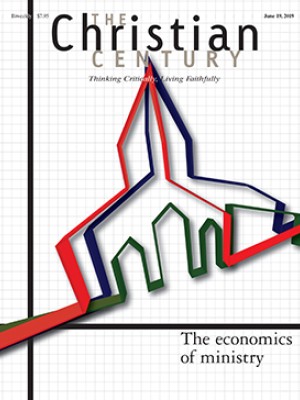June 30, Ordinary 13C (Luke 9:51-62; 1 Kings 19:15-16, 19-21)
Maybe Jesus’ words aren’t about me, my family, or my sacrifices. Maybe they’re about him.
As a newly minted community organizer, I often find myself wondering what this role should cost me. Organizing is work that somehow manages to be demanding and forgiving at the same time. It is laden with losses and yet invigorating. It pulls out of me a fierceness and a drive to fight for a world where I won’t have to fight anymore—where I won’t have to push and claw for the justice and freedom due to every human.
In community organizing, the value of winning is manifold and concrete. The stakes are high. We could win more money in the regional budget for public transportation; we could win the construction of a new high school in a hurting neighborhood. But the costs are concrete, too: nights spent in planning meetings instead of singing “Twinkle, Twinkle Little Star” and the ABCs in an endless round with my two-year-old daughter; sitting out the annual family “homecoming” church service and cookout in order to lead a training.
Read our latest issue or browse back issues.
I have been an ordained minister much longer than I’ve been an organizer. In that role, I have much more experience with the costs of the call: the missed family time, the bedside vigils, the miracles that don’t arrive, the constant wrestling to be better than I am.
This life as clergy and organizer—a life to which I believe I am called—tends to exact a high price. But I protect against becoming depleted by making sure I balance my life with things that pour into me, even as I give myself away. I make sure to nurture my relationship with my spouse and daughter, protecting some evenings for family time; I carve out time for restoration; I stay close to my good friends.
Elijah and Jesus, however, seem to set before their potential disciples two mutually exclusive options: choose me or your family. Elijah places his mantle on Elisha, a sign that he wants Elisha to carry on his prophetic work when Elijah is gone. Elisha says he will follow Elijah; he just wants to say good-bye to his parents first. Elijah responds in a way that is odd to my modern ears—“Go back; what have I done to you?”—as though he hasn’t just changed Elisha’s life in that moment. Elisha then effects a total abdication of his life as it was, in an irreversible way: he slaughters the livestock that powered his farmwork. He chooses life with Elijah, following in his footsteps to become the next chosen prophet to the people of God.
Hundreds of years later, Jesus has “set his face” toward Jerusalem, knowing it will be the scene of his death. Along the way there are people who ostensibly want to become his followers. He calls some and is called by others, but the conversation is essentially the same. I will follow you, says the potential disciple. How can you? Jesus replies. You have no idea what you’re saying.
Jesus’ response bothers me. It creates this distance between himself and those who want to walk with him. He tells one person that following him is too uncomfortable, uncertain, and unstable. “Let the dead bury the dead,” he says to a grieving son. “No one who . . . looks back is fit for the Kingdom of God,” he says to someone wishing to give their parents a last good-bye.
Stories involving Jesus’ own family seem to contradict this moment. While he does ignore his family’s requests from time to time, he also turns water to wine at Mary’s nudging and makes sure she is taken care of when he dies. He carries out a companion ministry to that of his cousin John. So why would Jesus deny a disciple, who has clearly already chosen the costly path of following him, the chance to simply say good-bye to his parents?
At times my vocation seems to exact an unreasonable price. Most often it is late work nights and time away from my family, an overexposure to the concrete evil of this world, a heightened sense of anxiety and despair, a haunting hunch that I will not live to see much of the justice I am fighting for.
It’s here that I realize that perhaps neither Elijah’s nor Jesus’ response is really about me, my family, or my sacrifice. Maybe their responses are really about them. Both men are walking toward the end of their lives on earth. They have come to the end of the road—and while many look on them with adoration and respect, they know what this life has cost them. As they set their faces toward the end, their words warn us that the call of God is not meant to set us up for a life of ease. It will not allow us to hide away at home or to let our daily obligations excuse us from the hard work of doing great things for God. The call of God exposes us, leaves us vulnerable, takes us far from the familiar.
Yet we go anyway. We keep showing up, catching up to Jesus on the road, closing chapters of our old life and moving forward in the direction of Christ. We know the cross is up there waiting. And still we go. We also stumble, look back longingly, stay too long in an old familiar place, turn our backs on the way, refuse to go another step, fail. But then we encounter him again, unexpectedly, on the road, and we are encouraged to rejoin the movement—to follow once again.






